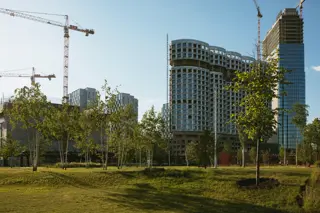Bangalore Adopts Ambitious Green Building Norms: What You Need to Know
 New regulations reshape Bengaluru’s real estate landscape with a strong focus on sustainability, impacting developers, architects, and homeowners alike. This comprehensive policy overhaul targets cutting down environmental footprints, boosting energy efficiency, and promoting eco-friendly construction practices across all new projects.
New regulations reshape Bengaluru’s real estate landscape with a strong focus on sustainability, impacting developers, architects, and homeowners alike. This comprehensive policy overhaul targets cutting down environmental footprints, boosting energy efficiency, and promoting eco-friendly construction practices across all new projects.
Key Components of Bengaluru’s Green Building Policy
1. Mandatory Energy Efficiency Standards
New buildings must incorporate double-glazed windows, high-performance insulation, and automated lighting systems to cut down energy use. Compliance with IGBC rating systems is now mandatory for projects over 2,000 sq ft. This change addresses India’s growing share in global greenhouse gas emissions – an estimated 40% attributed to buildings.
2. Sustainable Material Requirements
Developers get incentives for using:
- Fly ash bricks and recycled building materials
- Rapidly growing timbers (bamboo/viewport)
- Low-maintenance gypsum panels replacing traditional cement-based products. These materials reduce reliance on environmentally taxing raw materials while lowering construction costs.
3. Compensatory Afforestation Rules
Projects require one tree for every 80 sqm of built area. Urban developments must maintain 20% unpaved green spaces, blending structured landscapes with natural ecosystems.
Impact on Real Estate Developers
| Challenge | Opportunity |
|---|---|
| Higher upfront costs | IGBC certification as market differentiator |
| Compliance with multiple standards | Incentives through BBMP’s tax rebates |
| Penalties for non-compliance | Access to green financing at reduced rates |
Strategic adaptations include partnerships with IGBC-accredited consultants and early-stage integration of solar panels, rainwater harvesting systems and other amenities. According to IGBC data, just 5-6% of Bengaluru’s current built environment achieves green certification – leaving vast room for growth.
Government Incentives Driving Adoption
The Karnataka government proposes:
- Floor Area Ratio (FAR) bonuses for projects achieving net-zero water/waste
- Property tax rebates (5-10%) for IGBC-certified buildings
- Accelerated approvals for green compliance projects
While BBMP’s 2017 building bylaws already mandate waste segregation and solar installations, the new policy removes optional status from energy-efficient HVAC systems and waste recycling.
Future of Green Buildings in Bengaluru
By 2025, 50% of India’s new constructions could adopt green standards, with Bengaluru aiming for top national ranking through:
- Corporate leadership – IT Hubs and manufacture industries demand for high-efficiency workplaces
- Net Zero initiatives – 350+ organizations pledged to zero-energy/water goals
- State policy activation – Pending Karnataka green building credits acting as catalysts
Challenges remain in overcoming fragmented enforcement and limited incentives compared to solar energy subsidies. However, with IGBC targeting 10 billion sq ft of certified spaces by 2034, Bengaluru stands poised to redefine sustainable urban development.